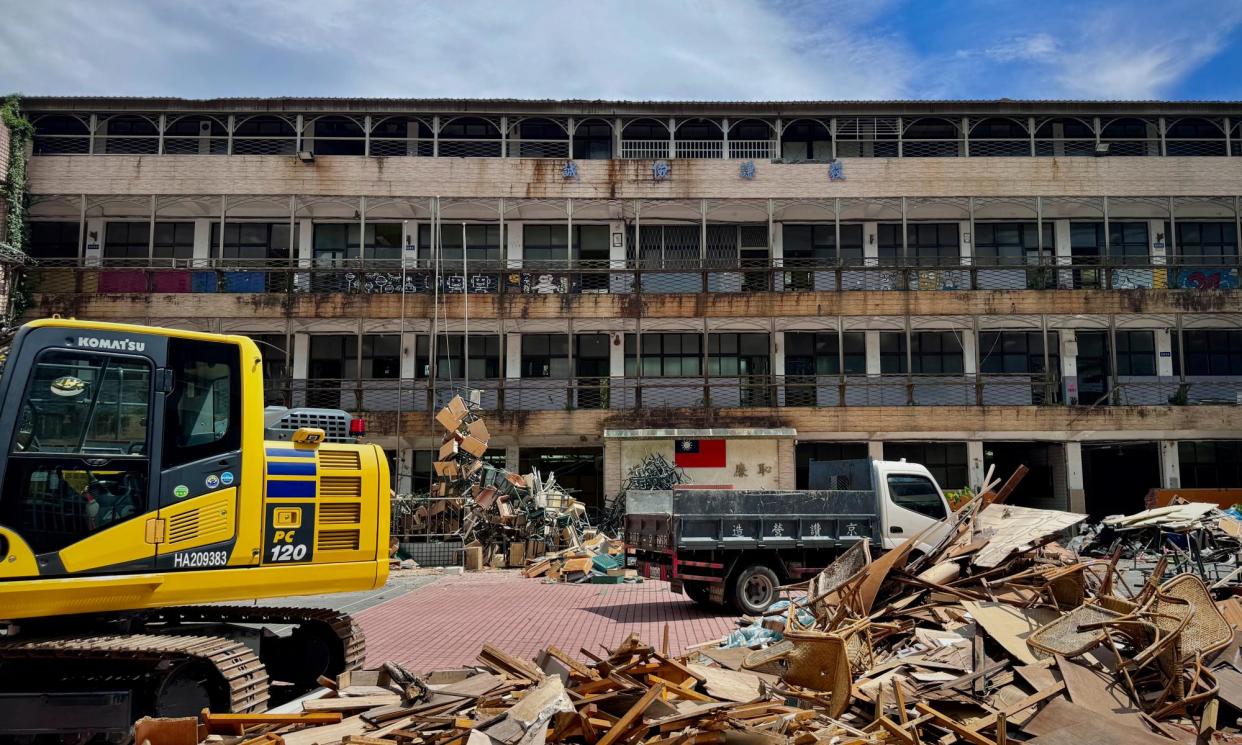Empty classrooms, silent halls: Taiwan’s declining birthrate forces schools to close

In the courtyard of the Chung Hsing private high school, desks and chairs are piled high like a monument or an unlit bonfire. Mounds of debris cover the play area, as two construction workers pull more broken furniture from empty classrooms, throwing them towards a pickup truck.
The central Taipei private school closed in 2019 after failing to reverse financial problems caused by low enrolment, and was sold to developers. The school was an early victim of a problem now sweeping across Taiwan’s educational institutions: decades of declining births mean there are no longer enough students to fill classrooms.
Related: South Korea thinktank suggests girls start school earlier to raise birthrate
Like much of east Asia, Taiwan is struggling to achieve the “replacement rate” needed to maintain a stable population. That rate is 2.1 babies per woman, but Taiwan hasn’t hit that number since the mid-80s. In 2023, the rate was 0.865.
Demographers and governments fear looming economic crises caused by a growing elderly population without enough working taxpayers to support them. In Taiwan, the impact of shrinking generations has already started affecting military recruitment, and now is flowing on to enrolments at schools and universities.
Between 2011 and 2021, the number of students in Taiwan’s primary and junior high schools dropped from 2.3 million to below 1.8 million.
Mrs Lai lives in Taipei city and has a 22-month-old child, but intends to stop there. “The cost of childcare is now high, in both time and money. It’s difficult to consider a second child without increasing salary levels and reducing working hours.”
“I focus on the quality of life for myself as well as my baby. Considering the current allocation of income and time, it would be difficult to maintain the satisfactory status quo if we had a second child.”
Private schools, which are not as popular as public ones, are going first. News reports indicate dozens of private schools are facing closure, and a Taiwan government list of schools requiring “extraordinary assistance” includes 13 private and vocational high schools that are at risk of shutting as early as next year, Taipei Times reported in March. The ministry of education told the Guardian that 15 colleges and universities have closed since 2014. Last week, it was revealed that four of Taiwan’s 103 private universities have been ordered to close, for the same reason as Chung Hsing high school.
Wu Chun-chung, the chairperson of the Union of Private School Educators, told local media he expects another 40-50 private universities to close by 2028.
Chou Ping, the president of the Taiwan Higher Education Union, says public universities are not facing imminent closure but those in suburban areas, particularly of lower rank or those devoted more to humanities than Stem subjects, were at highest risk.
The government in Taiwan, like those in China, Korea and Japan, have tried various financial incentives and regulatory changes to encourage people to have more – or any – children. But people continue to resist, citing the pressure of traditional gender roles falling unfairly on women, as well as rising costs of living and the difficulty of balancing careers. Salaries in Taiwan are relatively low, and city housing is expensive. This year, Taipei was found to be the second most unaffordable city in the world, after Hong Kong, when comparing house prices with average incomes.
Call to merge private with public
The parts of Taiwan with higher birthrates tend to be areas with lower costs of living that are still close to the capital, regions with generous local subsidies like the outlying islands, or places that have better employment opportunities and community services, like Hsinchu County. Hsinchu is Taiwan’s richest county, thanks to its massive science parks built largely around the semiconductor industry.
Its population has grown over the past five years, attracting young families.
“I think the parents in Zhubei [a city in Hsinchu county] are relatively better off than those in other counties and cities, so there doesn’t seem to be a decline in the birthrate in Zhubei,” says Zhubei mother-of-two, Mrs Hou.
Fu Jie-lin, director of academic affairs at the Jiafeng elementary school, says many junior high schools in Zhubei are overcrowded, and parents are so nervous about securing a place that they are trying to pre-enrol their children while they’re still newborns. Local media has reported predictions of a shortfall of 1,000 school enrolment places by 2027.
However, even Hsinchu’s baby boom appears to be slowing, with Fu reporting a “sharp drop” in enrolment numbers in the last two years. But it’s not necessarily bad thing, he says. “The size of the school is the same, and with fewer students, the teaching environment of the school will become better and students will have more space.”
It’s a sentiment shared by union leader Chou. He says the flailing private tertiary institutions should be merged with public universities rather than sold to developers. Chou says Taiwan underfunds universities compared with other OECD nations and has a far higher ratio of students to teachers. The universities can expand their campuses and shrink class sizes, Chou suggests.
“If we put more expenditure into public education we can help more low-income students, and the quality of education will be improved.”

 Yahoo News
Yahoo News 
